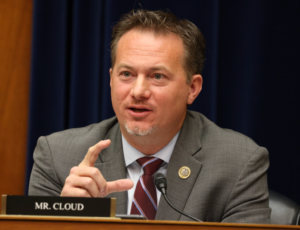Trita Parsi, vice president of the Soros-funded Quincy Institute, told Steve Bannon that ‘it does not matter’ whether Iran dominates the Middle East
Former Trump adviser Steve Bannon sat down with a longtime advocate for the regime in Iran to blast the Trump administration’s conduct in the Middle East, including its 12-day war against Iran, and to discuss what a real “America First” foreign policy would look like.
“You still have these massive forces inside the United States that are not America first,” Bannon told Trita Parsi, the longtime leader of the National Iranian American Council (NIAC), a pro-Iran lobbying group, who appeared on his War Room podcast Tuesday. “If we’re gonna be America first, we have to put the country first and the citizens in that country first,” Bannon continued, adding that “all the other guys around here, they’re all Israel first.”
Parsi, who now serves as vice president of the Koch- and Soros-funded Quincy Institute for Responsible Statecraft, filed an unsuccessful libel lawsuit in 2008 against an Iranian-American human rights activist who had accused him of being an agent of the Iranian regime. In throwing out the lawsuit, a federal judge said that Parsi’s work was “not inconsistent with the idea that he was first and foremost an advocate for the regime.”
Parsi told Bannon that the United States needs to “get out” of the Middle East, arguing that the region is “not that important to the United States any longer.”
“Whether it’s the Iranians dominating or the Saudis or the Emiratis, frankly, it doesn’t impact our interest that much,” Parsi said, dismissing the notion that America’s withdrawal would boost Iran’s influence in the region. “That argument … is not only moot because of [Iran’s] lack of capability, but also because of the fact it does not matter that much to us who is dominating,” he said.
Bannon omitted any mention of Parsi’s controversial tenure at the NIAC, but noted that critics of Parsi and the Quincy Institute have accused the think tank and its leadership of being “just a bunch of Koch-brother-sponsored libertarians, open borders, want-to-retreat isolationist defeatists.”
“The Greatest Generation gave us the platform for Pax Americana, and now you’re putting your tail between your legs and retreating back to be basically isolationist,” said Bannon. “Your response, sir?”
Parsi responded that the “whole thing about isolationism is just a red herring,” arguing that he embraces a pro-American foreign policy. “When you are trying to dominate every corner of the world all the time, you will be at war somewhere all the time,” he said. “And that is the history of the United States for the last couple of decades. Saying that we need to put an end to that is as pro-American as it possibly can get, in my view.”
During Parsi’s tenure at the NIAC, he and the organization faced accusations of directly lobbying on behalf of the Iranian regime. A federal district court judge in 2013 ordered the NIAC to pay more than $180,000 to the legal defense fund of the Iranian-American human rights activist whom NIAC had sued for libel. Congressional leaders also alleged that the NIAC violated the Foreign Agents Registration Act, which requires lobbyists for foreign governments to disclose the nature of their work.
Parsi gained attention in 2020 after he parroted anti-Trump talking points first issued by senior Iranian officials, writing that the administration’s stance on the violent protests in Portland that year was a “sign of America’s endless wars coming home.”
Parsi’s foray into conservative media is the latest attempt by the Quincy Institute to push isolationist positions in the Republican Party.
The National Interest in 2020 reported that the think tank viewed itself as being “in line with Trump world stars such as [Tucker] Carlson and Rep. Matt Gaetz,” and quoted an insider who said Quincy’s goal was to “provide intellectual ammunition to [Trump] and those on the Hill on the left and right who want to push back against the primacist elite that dominates Washington today.”
But Quincy’s efforts to pressure the first Trump administration on the Middle East fell short. Instead, the president made historic strides toward normalizing Israeli-Arab relations through the Abraham Accords, moved the U.S. embassy to Jerusalem, and eliminated former Iranian Revolutionary Guard Corps leader Qassem Soleimani.
The think tank’s failures did not stop Parsi from trying to forge alliances with right-leaning isolationists who have the president’s ear. During the Israel-Iran conflict over Tehran’s nuclear program this summer, Parsi praised Carlson for opposing the “neocon red line of zero enrichment.”
“At a crucial moment, Tucker wisely advises Trump to drop this deal-killing demand. Huge!” he wrote on X.
Parsi’s renewed advocacy appears to have fallen on deaf ears. Not only did Trump join Israel’s strikes on the Iranian nuclear program, but 90 percent of the president’s voters supported his actions.
Eighty-seven percent of Trump voters agreed that “Iran obtaining nuclear weapons would be an existential threat to the United States and our allies that justifies military action to prevent,” according to a GrayHouse poll taken shortly after the U.S. strikes, while 74 percent told pollsters that the attack made America either “much safer” or “somewhat safer.”
Read the full article here







